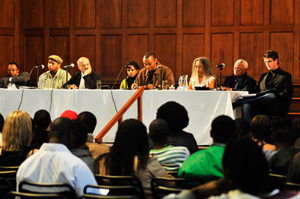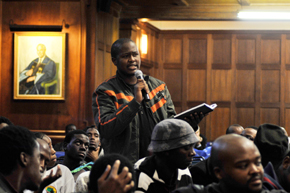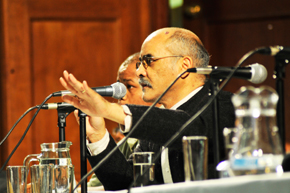Great debate on admissions gets under way
11 May 2009 Panellists get the ball rolling
Panellists get the ball rolling
The recent Great Debate on UCT's admission policy drew together a number of views on the subjects of transformation of our society, redress within the higher education sector, and the use of race as a proxy for disadvantage in UCT's admission policy.
The following excerpts have been culled from panellists' written and oral statements.
The full debate can be downloaded from the resources section of the Admissions Policy website on Vula.
The Admission Review Task Team, chaired by Acting Deputy Vice-Chancellor Professor Crain Soudien, is setting up meetings with various stakeholders across campus.
Tende Makofane, South African Students' Congress (SASCO)
- Race is still closely correlated to disadvantage in SA. It doesn't make any sense to use other proxies to address the direct imbalances that were created on racial basis (by apartheid).
- The question of redress can never be addressed on admission policy alone. We must redress all the imbalances which were inculcated by the apartheid regime.
- The academic performance of white students (at schools) is still much higher than that of African, coloured and Indian students. There is not significant difference in performance between black students in under-resourced schools and those in middle-class schools, except among those at the richest schools in the country.
- Certain people hold the view that equity is tantamount to a compromise in quality. The university's pass rates suggest the contrary. African students have been shown to have a success rate of 79%, coloured students 81% and Indians 86% as compared to 91% of white students.
- To increase equity will lead to improvement of quality in institutions.
Ryno Geldenhuys, Democratic Alliance Students' Organisation (DASO)
- Many university admission polices are based on racial considerations which are used as a proxy measure for educational disadvantage. This policy has included the lowering of admission standards for certain racial groups without ensuring that that is met with increased throughout rates.
- We must continue to work for access to tertiary institutions for SA's poor and disadvantaged. However, there are many innovative ways to do this that do not require classification on arbitrary racial lines. We oppose such classification. We do not support the lowering of admissions criteria. However, the admission criteria should take into account any existing personal or economic disadvantages. Access should be increased through more needs-based bursaries, increased head-hunting in poorer or disadvantaged schools, and a better tutoring and mentoring programmes at university to ensure better throughput rates. In most cases the admission policy, as it stands, works as it should in identifying those who should be given the opportunity to attend UCT. We do, however, contend that the number of cases in which the policy is failing to give all South Africans of ability the opportunity is growing.
Professor David Benatar, UCT
- We all agree on the need to rectify injustice. If you want to rectify a disadvantage, then why use a proxy for disadvantage when you can use disadvantage itself?
- One possible scenario: determine whether (schools) are disadvantaged or not and have your admission policy favour people to the extent that they come from a disadvantaged school.
- People say we need diversity of opinion in a university. If you're interested in diversity of opinion, don't take a proxy, namely race; why not go after diversity of opinion itself? Have opinion tests on admission applications.
- People say we need to have black role models and teachers. There are also many claims about how racial diversity improves a university but the evidence is methodologically dubious.
- There is a long history of these sorts of (racial) classifications laying the foundation for inter-group conflict. And I think we need to avoid that. We can do so while still redressing injustice.
Siyaduma Biniza, Congress of the People (COPE)
- Race as a proxy for disadvantage should remain and the issue of academic development programmes should be addressed. The throughput of black students at UCT must be developed at academic development level. The point of redress is to redress issues that are deeply rooted, social-economic issues, financial issues, that aren't solved by being accepted into university and excluded after the first year. Black students from disadvantaged backgrounds are inadequately prepared for university.
- The problem isn't finding black students; the issue is that UCT doesn't represent the demography of South Africa.
Dr Zimitri Erasmus, UCT
- In thinking about new criteria for admissions, we do not need race categories. UCT (should) add a disclaimer about race classification on all its official forms and expand the categories it offers on these forms; partner with the Academy of Sciences of SA on research to develop sophisticated tools for assessing disadvantage for the purposes of redress in higher education, with a view to eventually abolishing race categories on all of South Africa's official documentation; develop a more holistic, involved and transformative conception of recruitment in an effort to erode the complex barriers to accessing a place to study at the institution; and hire an agent to facilitate foreign student study permits and visas.
- UCT talks about the need to identify "academic potential at the individual level", and to use socio-economic indicators such as family income and school attended. The university needs to work towards making these promises real. We must move away from thinking with our eyes, to listening to our stories.
 |
 |
| Putuma Zengetwa asks a question from the floor. | Prof Crain Soudien orchestrates proceedings. |
Dr Tlhalo Raditlhalo, UCT
- 'Race' as a category seems intricately tied to notions of white superiority and black inferiority which have significantly shaped the mind-sets of both black and white South Africans.
- In the main, South Africans are not moved by the moral vision that apartheid was wrong nor are they by the need to make amends for that past.
- None of the historically disadvantaged institutions are having any of these kinds of debates. UCT should evolve into a new public university. We need to provide for an inclusive institution.
- The community must have a buy-in into whatever kind of admission policy we will have.
- Personally, I find the burden of 'race' rather than being a member of the human race, irksome. I'm tired of race, and yet, race impinges on me. Students seem by and large to expect a mistake from me. South African students do not associate me with excellence.
Xanthea Limberg, Young Independent Democrats
- Transformation policies need to be employed and race ought to be a factor in those processes.
- The university is a great platform to build social cohesion and to build a diverse environment for everyone. There are so many inequalities in our schooling system that it is not a suitable measure for admissions within universities. Race should (not) be the sole component but we should also take into account high school classification, class and introducing more programmes of intervention to create racial diversity within our university. We must also look at employment equity and the culture within the institution.
- We must address these in a way that we do not exclude white people but to redress the injustices of the past.
Professor Neville Alexander, UCT
- I don't see any fundamental contradictions among the various speakers. In SA one of the main reasons for hope is that we are not sweeping things like race under the carpet.
- Admission policy at this university is a tiny corner of a very large canvas about historical redress, affirmative action, the empowerment of the oppressed people.
- Section 1b of the SA constitution is very clear that we are committing ourselves to a non-racial, non-sexist future. Every speaker agrees we want to move away from a society in which race determines the worth and the character of people. I am very clear about what we need to do: We need to move away from race.
- I see this as the beginning of a whole long process - it mustn't take too long because people are going to get frustrated. The university has got to be congratulated on starting it.
Dr Molapo Qhobela, national Department of Education
- Government didn't say what type of admission policy you must have. All it said is that there should be some kind of policy.
- The university is debating; it is listening to its students, to its academics and it is making a decision to go in a particular direction. Institutional autonomy and academic freedom do work and can be used to good effect for positive change.
- This university is part of a new SA. It is a different institution than it was 11 years ago. It will be a different institution in time to come.
- We have a participation rate in our higher education system of around 17% of our population. Most countries are around 50% to 60%, sometimes 70%. If you disaggregate the 17%, you will find that white students have 60% participation rate relative to African students who have about 12%.
 This work is licensed under a Creative Commons Attribution-NoDerivatives 4.0 International License.
This work is licensed under a Creative Commons Attribution-NoDerivatives 4.0 International License.
Please view the republishing articles page for more information.










